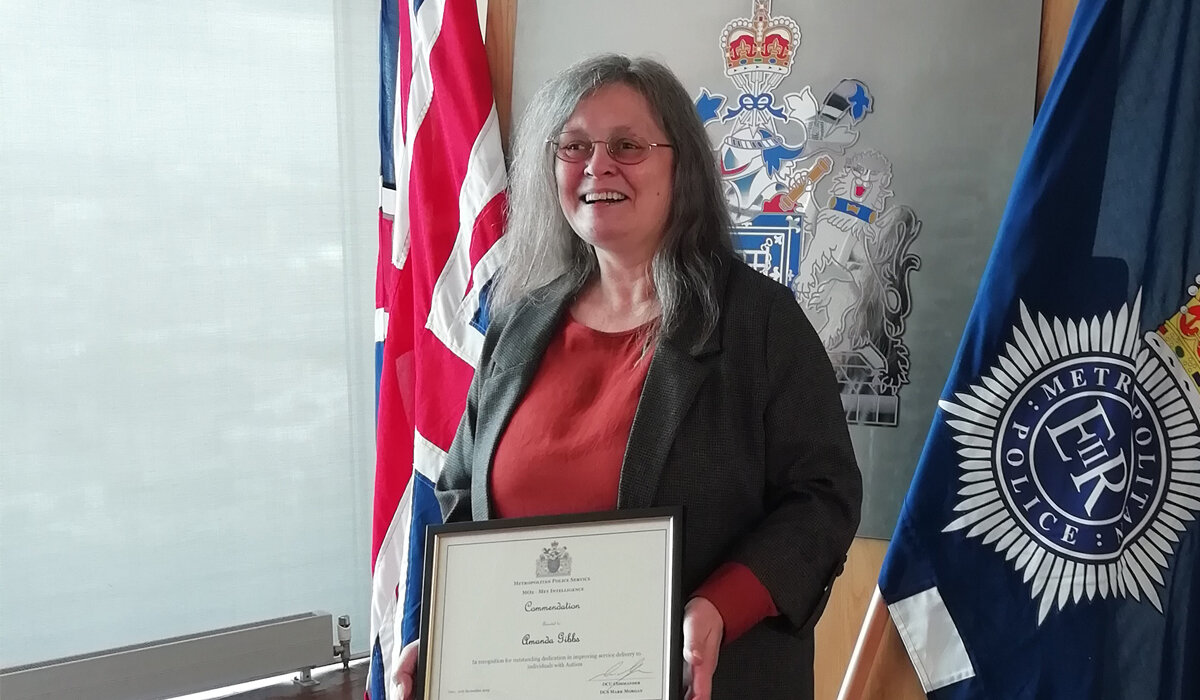
"It seems that autistic adults in the adult social care system have been forgotten."
Julie Sharp
- on accessing support during the pandemic
Stories from the Spectrum: Julie Sharp
Our report into the impact of coronavirus found that 9 in 10 autistic people worried about their mental health during the pandemic. We’re asking the Chancellor to make sure there is funding for mental health services – join us by signing our open letter here.
With this in mind, we caught up with autistic campaigner and fundraiser, Julie Sharp. Julie also has a diagnosis of Triple X syndrome, which puts her in a high-risk category. She spoke to us about her diagnoses, how coronavirus has impacted her, and why more needs to be done to support autistic people and those with disabilities during this uncertain time.
When were you diagnosed as autistic and what made you seek a diagnosis?
I was diagnosed as autistic in June 2018. I was seeing a speech and language therapist and she asked if I would like to be put forward for an autism diagnosis. I said ok. I had seen numerous speech and language therapists over the years. Each of them had often asked if I had a diagnosis of autism and I had always said no. I did not think for one minute that I would be autistic. It came as a huge shock. None of my family were expecting it either.
What is being autistic like for you?
I feel I live in a world that doesn’t understand me. I feel that when I speak it is not interpreted in the way I intended it. I feel I have a lot to give but not much opportunity to give it. I have discovered that when you get an autism diagnosis, people often just focus on this, and behave as though all your past diagnoses magically disappear.
In 2008 I had a pneumothorax (a collapsed lung), which meant that my asthma became worse. I also have an extra chromosome in every cell. This condition is called Triple X syndrome. As a result, my muscles seem to be weaker and I have a hard job walking. I use a walking frame to get from my bed to the toilet. I use a wheelchair to go further distances such as from my bed to the kitchen. I hope my wheelchair is only temporary but I have had it since 2008, so it is a very long ‘temporary’.
I have had my wheelchair longer then I’ve had my autism diagnosis. I do not think my wheelchair and I will ever get on, partly because I am autistic. To me, chairs should not move. I do not like the dentist chair, office chair or a wheelchair. Every day I strive to rehabilitate back to being able to walk everywhere. I’m not there yet, but I’m aiming for 100 steps in a day.
How are you coping with the current coronavirus restrictions?
In April I was put in the clinically extremely vulnerable group. I kind of liked it because no one came to my house. I didn’t really notice that the world was shut. However, what I did notice was my social care support stopped. This wasn’t too problematic at the time but became more problematic as the world began to open again. As the world opened, I had no support to go out in the community, so I haven’t gone out in the community. I have remained in lockdown for some six months now.
People are all talking of going about their normal life in the ‘new normal’, but I am not. I’m still in lockdown. It seems that autistic adults in the adult social care system have been forgotten.
"It seems that autistic adults in the adult social care system have been forgotten."
Could you tell us a bit about your campaign work and fundraising? What does it involve?
During coronavirus lockdown there have been a lot of campaign opportunities on X. My favourite ones are the surveys. I love filling in surveys. I like it how each question has either one or two choices you can pick. It is predictable and helps me to relax. I always keep an eye on X for surveys to do with disability, lung conditions, autism and coronavirus. During the lockdown, I have taken part in various Zoom focus groups, which I found through X. I like focus groups because you are asked direct questions and expected to give blunt honest answers. No one takes offence at your blunt honest answers. In fact, people tend to encourage me to be like this for the purpose of focus groups.
At the beginning of the year I had started making craft items to sell at a fair for Autism East Midlands. Unfortunately, coronavirus came along and put a stop to my plans. I started thinking about other fundraising ideas, and this led to me doing musical treats. I played excerpts from tunes on one of my many musical instruments. I posted these videos on X and asked people to make donations. Each month I chose a different charity to do musical treats for. This gave me a reason to make music and it meant I was doing fundraising. In my eyes this was helping me and others. I always need a motivation to do something and helping others is a very good motivation.
I am currently working on doing 100 steps a day, to raise money for the British Lung Foundation. It is my lung condition that placed me in the clinical extremely vulnerable group. Unfortunately, I had a fall during the lockdown, and this put my rehabilitation back by several years. I am hoping that doing 100 steps over a day will help get me back on the road to rehabilitation. While to many people, 100 steps may seem insignificant, for me it will be a way of improving my breathing.
How can non-autistic people and members of the public support autistic people during this time of uncertainty?
Remember that we’re still alive and that we might actually want someone to say hello or say, ‘do you fancy coming out for a walk?’, ‘would you like to go out for a drive?’, ‘do you want to go shopping? I will show you how the shops now work’, ‘do you want to go on a bus? I’ll show you how the buses now work’. Everything is new, big and there’s no one to show you how it works. It would be really nice if somebody would.
"Everything is new, big and there’s no one to show you how it works. It would be really nice if somebody would."

Watch our animation
We created a short animation, inspired by our interview with Julie.
Sign our open letter
Sign our open letter to Chancellor Rishi Sunak MP and help transform the lives of autistic people and their families during these difficult times.
Similar stories

"I decided to try to improve future contact with the police for as many autistic people as possible."
Amanda Gibbs
- on creating the Autism Alert Card and passport
Read more

The Spectrum magazine
Explore one of the UK's largest collections of autistic art, poetry, and prose. The Spectrum magazine is created by and for autistic people, and is available both online and in print.
Read the Spectrum





You are not alone
Join the community
Our online community is a place for autistic people and their families to meet like-minded people and share their experiences.
Join today